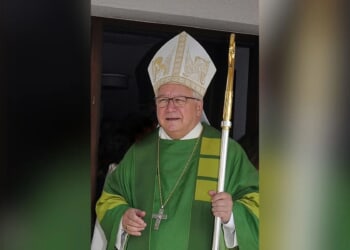
The U.S. Supreme Court has temporarily halted the Trump administration’s planned deportations of a group of Venezuelan nationals detained in Texas, following an emergency appeal filed by the American Civil Liberties Union (ACLU).
The order, issued in the early hours of Saturday, blocks the removal of detainees currently being held at the Bluebonnet Detention Center in Anson, Texas, approximately 200 miles north of the U.S.–Mexico border.
The Supreme Court’s brief directive stated that the Venezuelans “not be removed from the United States pending further order of this Court.” Justices Clarence Thomas and Samuel Alito dissented from the order.
BREAKING: The U.S. Supreme Court issued a ruling early Saturday AM blocking the deportations of Venezuelan men under 18th century Alien Enemies Act. Justices Clarence Thomas and Samuel Alito dissented. pic.twitter.com/JfMNnFsMjM
— Carolyn Barber, MD (@cbarbermd) April 19, 2025
Trump’s Sovereign Wealth Fund: What Could It Mean For Your Money?
The emergency appeal from the ACLU argued that immigration authorities were attempting to carry out deportations under the Alien Enemies Act of 1798 without giving detainees a meaningful opportunity to contest their removal, as required by law.
The Supreme Court previously ruled that such removals could proceed only if individuals were provided a reasonable time to seek judicial review.
This Could Be the Most Important Video Gun Owners Watch All Year
President Donald Trump has invoked the rarely used Alien Enemies Act, an 18th-century statute that allows the president to deport foreign nationals deemed enemies of the United States during wartime. The statute was last widely used during World War II.
The current dispute focuses on Venezuelan nationals the administration claims are associated with Tren de Aragua, a criminal organization based in South America that the Trump administration has labeled a terrorist group.
Some of the detainees were moved to Bluebonnet Detention Center shortly before the scheduled deportations, prompting urgent legal action from their attorneys.
Attorneys representing the detainees said their clients were handed notices classifying them as “Alien Enemies” and indicating they would be removed.
The ACLU filed those documents with the court, including one unsigned notice dated April 18 that read, “You have been determined to be an Alien Enemy subject to apprehension, restraint, and removal.”
According to the ACLU, some of the detainees had already been placed on buses and were told they would be deported.
The organization filed urgent motions in multiple courts on Friday, including the Supreme Court, after receiving no immediate relief from U.S. District Judge James Hendrix in Abilene, Texas, or the Fifth Circuit Court of Appeals in New Orleans.
The Supreme Court paused the Trump administration’s plan to deport Venezuelan men in custody, ensuring they receive judicial review. The case could test the balance of power — and spark a constitutional showdown https://t.co/W69Ivs17LO pic.twitter.com/LoXb3XZ6mH
— Reuters (@Reuters) April 19, 2025
Meanwhile, a separate legal hearing unfolded in Washington, D.C., where U.S. District Judge James Boasberg—who previously blocked some deportation flights—expressed concern that additional removals could occur over the weekend.
“At this point, I just don’t think I have the power to do anything about it,” Boasberg said Friday, although he declined a request from the ACLU to block further deportations.
Boasberg had earlier cited the Supreme Court’s April 7 ruling, which allowed the Trump administration to proceed with removals under the Alien Enemies Act, but emphasized the government must provide detainees adequate notice and access to the courts before removal.
2/ AND even though ACLU is already seeking an injunction pending appeal in the 5th Circuit. So apparently, Judge Boasberg not only runs the Executive Branch, he runs the entire judicial branch too. pic.twitter.com/86LBUqhy6p
— Margot Cleveland (@ProfMJCleveland) April 18, 2025
The Department of Justice told the court that it had no current knowledge of scheduled deportation flights for Saturday but added that the Department of Homeland Security reserved the right to conduct removals.
Asked about the case on Friday, President Trump said he had not been briefed on the specific individuals involved but stated, “If they’re bad people, I would certainly authorize it. That’s why I was elected. A judge wasn’t elected.”
White House and DHS officials have not disclosed how much notice they plan to give detainees before removal.
Attorneys representing the migrants have asked for at least 30 days to challenge the government’s classification and planned deportations.
The Supreme Court’s April ruling did not specify a required timeframe.
In a statement Friday, Assistant Secretary for Homeland Security Tricia McLaughlin said, “We are not going to reveal the details of counterterrorism operations, but we are complying with the Supreme Court’s ruling.”
The administration has already deported over 130 Venezuelan nationals identified as alleged members of Tren de Aragua to El Salvador on March 15.
Defense attorneys and family members have disputed those classifications, saying several of the individuals had no ties to criminal activity and were denied the opportunity to defend themselves before removal.
The Supreme Court is expected to issue further guidance in the coming days regarding the fate of the remaining detainees currently held in Texas.
Connect with Vetted Off-Duty Cops to Instantly Fulfill Your Security Needs

![Federal Judge Defies SCOTUS, Threatens Trump Officials with Criminal Charges [WATCH]](https://www.right2024.com/wp-content/uploads/2025/04/Federal-Judge-Defies-SCOTUS-Threatens-Trump-Officials-with-Criminal-Charges-750x375.jpg)
![NYC Tourist Helicopter Falls into Hudson River, Siemens Executive and Family Among Those Killed [WATCH]](https://www.right2024.com/wp-content/uploads/2025/04/NYC-Tourist-Helicopter-Falls-into-Hudson-River-Siemens-Executive-and-350x250.jpg)






![Green Day’s Cringe Trump Diss Ends in Fire and Evacuation [WATCH]](https://www.right2024.com/wp-content/uploads/2025/04/Green-Days-Cringe-Trump-Diss-Ends-in-Fire-and-Evacuation-350x250.jpg)
![Red Sox Fan Makes the ‘Catch of the Day’ with Unconventional ‘Glove’ [WATCH]](https://www.right2024.com/wp-content/uploads/2025/04/Red-Sox-Fan-Makes-the-‘Catch-of-the-Day-with-350x250.jpg)
![Bikini Clad Spring Breakers Prove Our Education System is Failing Students [WATCH]](https://www.right2024.com/wp-content/uploads/2025/03/Bikini-Clad-Spring-Breakers-Prove-Our-Education-System-is-Failing-350x250.jpg)





